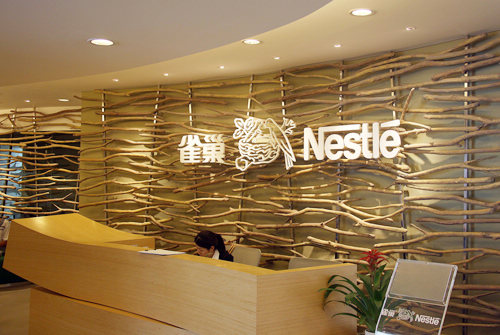|
 |
|
MAKING A BIG DEAL: The picture is the headquarters of Nestle China in Beijing. The company recently agreed to purchase a 60-percent stake in Chinese food company Hsu Fu Chi International Ltd. (ZHANG CHUANQI ) |
Wang is concerned that if multinationals' portfolios of Chinese acquisitions become too thick, it will inevitably restrain the growth and development of China's domestic brands and affect China's economic independence.
If domestic brands are not protected against foreign companies, China could lose these brands forever, Wang said.
Protecting domestic brands
Peng Guangyi, General Manager of Beijing Tea Corp., remembers a time-honored tea brand called Jinghua. At its height, the Jinghua brand held an 80-percent market share in Beijing with annual sales of 300 million yuan ($46.58 million).
In 1999, the tea brand was purchased by Unilever. After eight years, the brand has almost disappeared. In 2007, after negotiation with Unilever, Beijing Tea Corp. bought back the brand and re-established it in China.
"We believed foreign companies were capable of developing the Jinghua brand. But in the end, this is not what happened," Peng said.
Among all domestic brands purchased by foreign ventures, time-honored brands face the biggest challenge, Peng said. Under public pressure, MOFCOM has become prudent in approving cases where well-known Chinese brands are being purchased by foreign companies.
According to assessments by the China General Chamber of Commerce (CGCC), only those enterprises with a history of more than 50 years, strong Chinese characteristics and distinct regional cultures, high commercial and cultural values and good reputations are qualified as time-honored enterprises.
MOFCOM's latest figures show that in China there are 1,600 of these companies. They are not only engaged in market behaviors, but also carry on rich cultures, widely accepted by Chinese consumers.
These time-honored brands are the kind that foreign companies sniff out when entering new markets, and China has been no exceptions. Since China has no established norms for evaluating famous brands, some of these brands are sold at low prices or even acquired by hostile purchasers.
The Provisions on Mergers and Acquisitions of Domestic Enterprises by Foreign Investors promulgated by MOFCOM on August 9, 2006 requires that all mergers and acquisitions of famous brands be subject to MOFCOM approval.
In the past three years, nearly one fifth of the acquisitions of time-honored brands have been approved. Besides the recent Nestle case, a dozen acquisition cases by foreign companies await MOFCOM approval, such as Yum! Brands purchasing Little Sheep. Yum! Brands is the world's largest restaurant company whose famous restaurant brands include KFC, Pizza Hut and Taco Bell, and Little Sheep is a famous hot pot restaurant chain in China.
Tough decision
The development outlook for many domestic brands is not optimistic. Among the country's 1,600 time-honored brands, 70 percent are struggling for survival, 20 percent are losing money or are close to bankruptcy, and only 10 percent are making profits.
The main culprit of this problem is capital inadequacy, which goes to explain why domestic companies are easily acquired by their much richer international counterparts.
"Changes have taken place in the financing of many time-honored brands. They no longer wait for injection of foreign capital, but make themselves listed for financing," said An Huimin, Vice Chairman of CGCC.
Today, 41 Chinese time-honored enterprises have been listed. "Nestle, with a history of 114 years, is an international time-honored brand, while Chinese time-honored brands can make the same achievements as Nestle does," An said.
Beijing has over 80 time-honored enterprises in the catering industry, the most among all Chinese cities. After restructuring and integration, many of these enterprises have been listed and transformed.
An said many time-honored brands are facing the problem of renovating their development ideas. When carrying on traditional Chinese cultural heritage, time-honored enterprises must absorb advanced management expertise and experience from foreign countries and renovate their ideas and mechanism.
Successful listing cases of time-honored enterprises bring new direction for the development of all time-honored enterprises. Suzhou Songhelou Restaurant, a 200-year-old restaurant chain, has abandoned acquisition negotiations with foreign companies and plans to get listed within two years. If successfully listed, Songhelou Restaurant will set a model for other traditional brands across the country.
However, there are some concerns about listing traditional enterprises. Jiang Junxian, former president of China Quanjude (Group) Co. Ltd., said listing is risky for these enterprises. For some, survival is the main task.
Jiang said to some enterprises, unique and secret formulas determine their survival, but if listed, these formulas must be made public. After being listed, the shareholders structure may be changed, likely to reverse the old management strategies, a decision these companies should not take lightly.
Brands' Market Share Dwindles
Maxam: The brand had a 20-percent market share nationwide before acquisition. In 1990, brand owner Shanghai Jahwa United Co. Ltd. entered an alliance with SC Johnson Wax, and the brand Maxam was shelved. Shanghai Jahwa bought the Maxam brand back in 1994 for 500 million yuan ($77.64 million), but the brand had lost its place in the market.
Zhonghua: In 1994 Unilever gained control of the Shanghai Toothpaste Factory and leased the operational right of the Zhonghua brand. Now the market share of Zhonghua toothpaste is below 6 percent in the country.
Robust: In 2000, Robust was purchased by Danone. The brand is barely visible in today's market.
Mini Nurse: In 2003, L'Oreal purchased the brand Mini Nurse. Now, the brand has almost disappeared from the market. | 